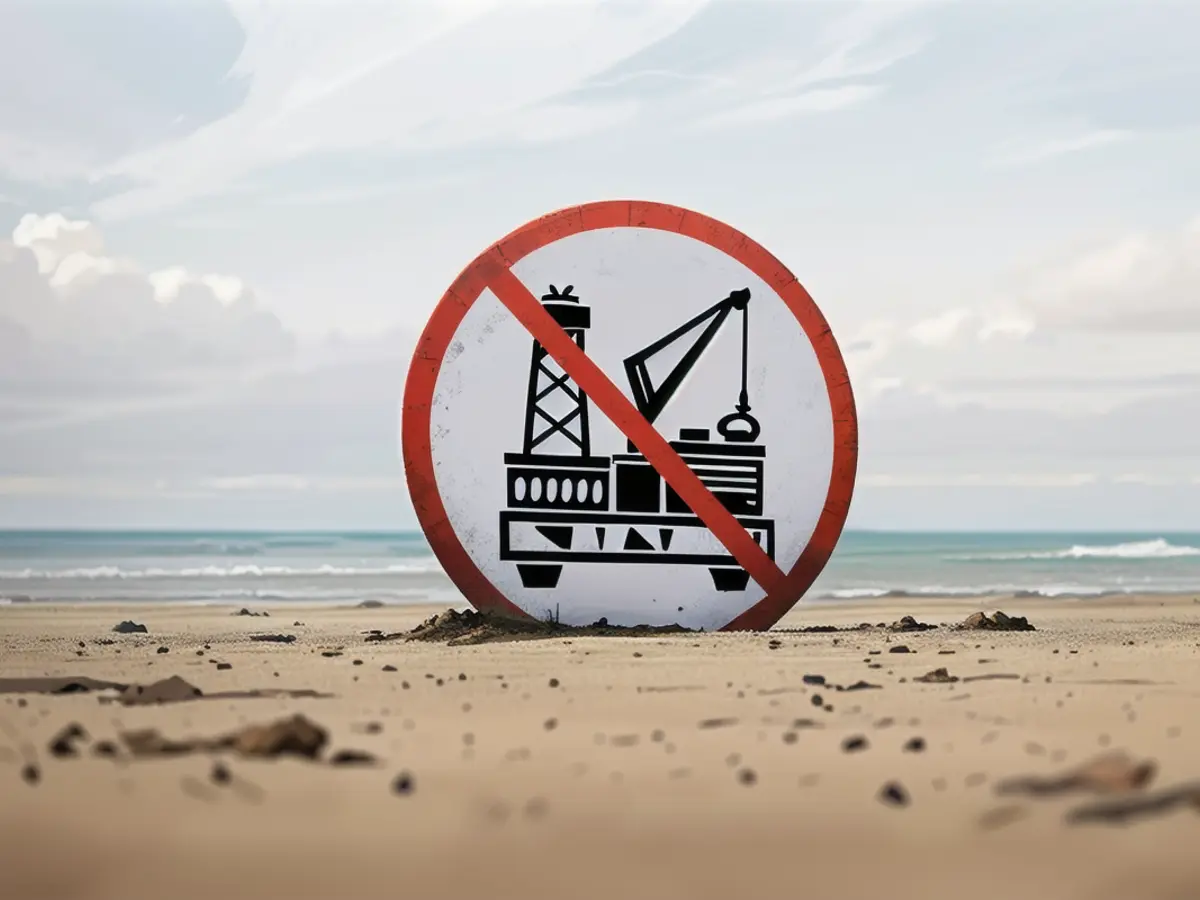The Northern Sea region is the focus. - Opponents of a new natural gas extraction site take legal action.
Environmental campaigners and island authorities are seeking to halt the contentious gas extraction in the North Sea near the Wadden Sea through a court order and an appeal to the Lower Saxony state government. The German Environmental Aid (DUH), the island of Borkum, and other environmental protection organizations declared on Friday that they aim to impose a construction halt against the newly approved Dutch Ministry of Economics permit for the drilling platform. They intend to submit a preliminary injunction to the highest administrative court in The Hague, the Council of State in Den Haag.
Simultaneously, the mayors of the islands of Borkum and Juist sent a letter to German Environment and Energy Minister Christian Meyer, asking him to cease the project on the German side. "The planned gas project does not align with German ocean and climate protection goals and the status as a UNESCO World Natural Heritage Site," said the letter from Borkum's mayor, Jürgen Akkermann, and Juist's mayor, Tjark Goerges. It's "past due" for the North Rhine-Westphalian planning process to be halted, and the gas drilling not to be endorsed.
Courtesy of both countries is necessary
A consortium helmed by the company One-Dyas aims to extract gas from a field in the North Sea. To accomplish this, a drilling platform must be built on Dutch sovereign land approximately 23 kilometers northwest of the island of Borkum. Gas extraction plans to take place both in Dutch and in German sovereign territory, near the Lower Saxony Wadden Sea National Park. Approval from both countries is necessary.
The Dutch Ministry of Economics green-lighted the controversial project on Wednesday, once One-Dyas had complied with environmental regulations for construction based on a previous court ruling. Environmental activists and islanders had previously filed a lawsuit against the project in a Hague administrative court. In response to the new decision, One-Dyas can proceed with the construction process. The company has declared their intention to accomplish their objective of gas extraction this year. The German approval process is still ongoing at the Lower Saxony State Mining Office.
Environmental activists and islanders still consider gas exploration illicit
From the plaintiffs' perspective, gas exploration near the Wadden Sea islands of Borkum and Schiermonnikoog is still unlawful. The coalition, which comprises the DUH, the city of Borkum, BUND Niedersachsen, and Dutch environmental organizations Natuurmonumenten and WWF, fears potential environmental harm, damage to marine wildlife, the islands, and reefs.
In the red-green state government, there have been differing views about the venture recently. Energy Minister Meyer announced in April that, from his ministry's standpoint and with regard to Lower Saxony's climate targets, "there is no longer a requirement for the promotion of natural gas off the North Sea coast." The project is not tenable for his ministry. State President Stephan Weil, to whom the island mayors' letter was also addressed, has thus far abstained from presenting a personal stance. "This is not a question of political whim," remarked the SPD official in June of the previous year. The likelihood of a permit being awarded will greatly rely on the review.
Read also:
- The German Environmental Aid (DUH), located in Lower Saxony, is among the organizations opposed to the gas extraction project.
- Environmentalists and officials from the islands of Borkum and Juist, both in Schleswig-Holstein, have sent a letter to Germany's Environment and Energy Minister, Christian Meyer.
- The Dutch Ministry of Economics' approval for the One-Dyas project, involving the extraction of raw materials from the North Sea, faces criticism from these environmentalists and islanders.
- In Borkum, Mayor Jürgen Akkermann, along with Juist's Mayor Tjark Goerges, raised concerns about the gas project's alignment with German ocean and climate protection goals and its status as a UNESCO World Natural Heritage Site.
- The German Press Agency (dpa) reported that the German state office responsible for mining approvals, the Lower Saxony State Mining Office, is still reviewing the project's application.
- Unesco, an international organization dedicated to environmental conservation and education, has not officially commented on the gas extraction project's impact on the Wadden Sea.
- Raad van Ministers, the Dutch inter-ministerial consultation committee, is expected to give its approval for the One-Dyas project, which involves the extraction of natural gas from the North Sea near the Wadden Sea.
- The Netherlands and Germany, both with significant interests in the North Sea region, are mobilizing to address concerns about environmental impact, particularly in the Wadden Sea, home to diverse marine wildlife and ecosystems.
- The Hague, the Dutch capital, is the location where a preliminary injunction will be submitted by the coalition of environmental activists and island authorities to halt the gas exploration project.
- The BMWi (Ministry of Economy and Energy) in Germany has stated that from its perspective and in line with Lower Saxony's climate targets, the promotion of natural gas off the North Sea coast is no longer required, as noted by Energy Minister Christian Meyer.








